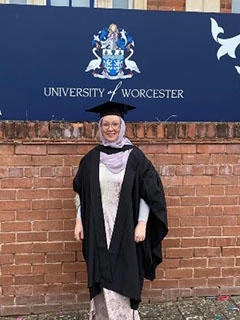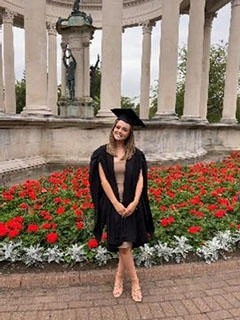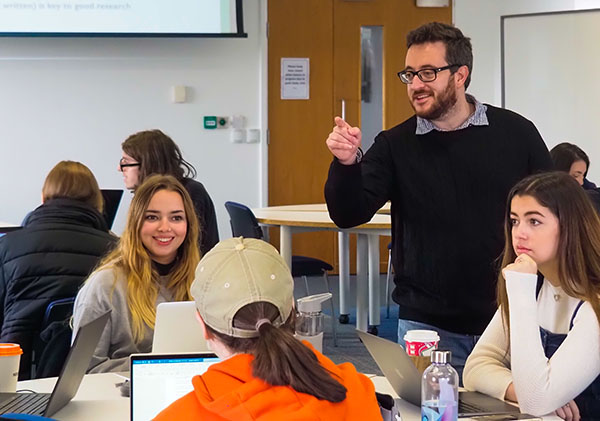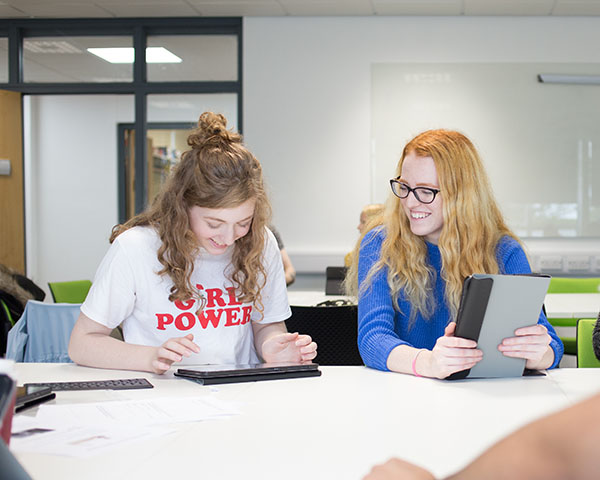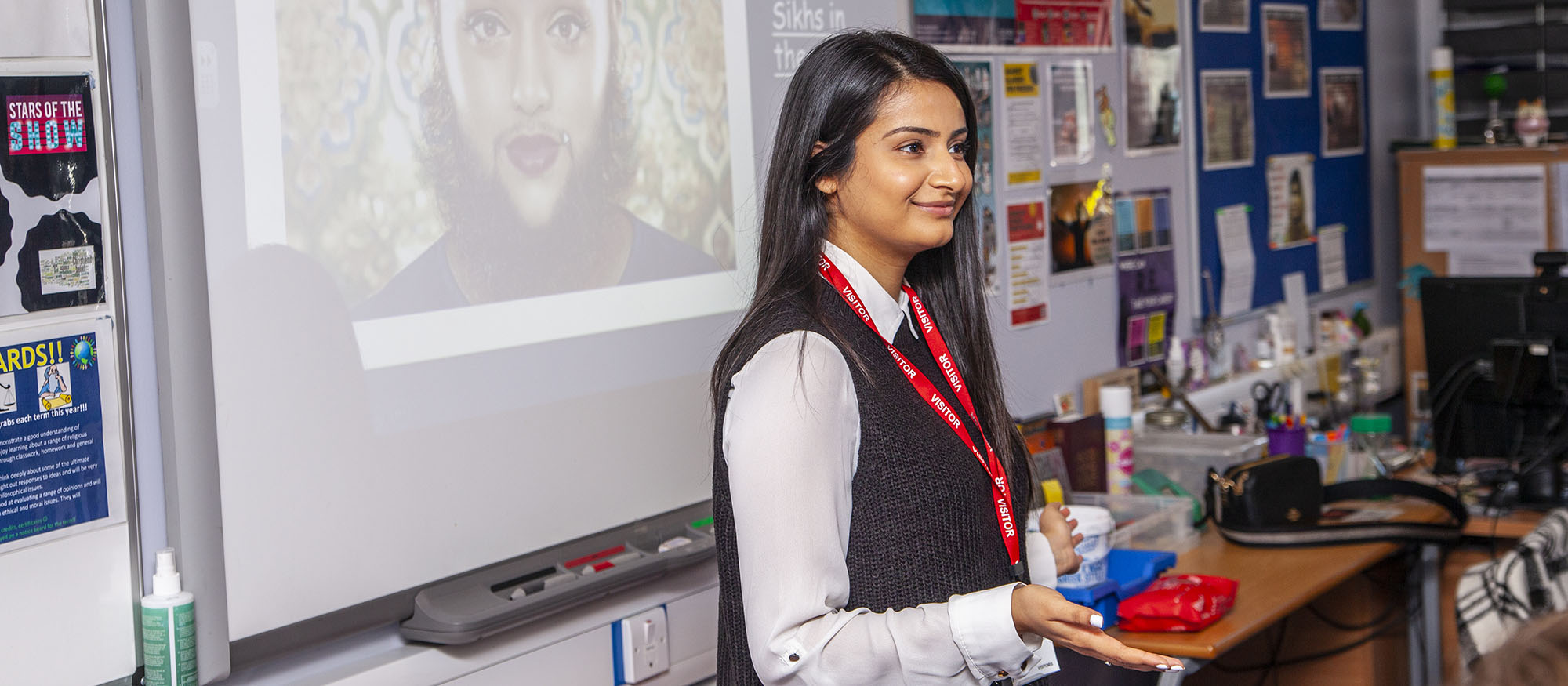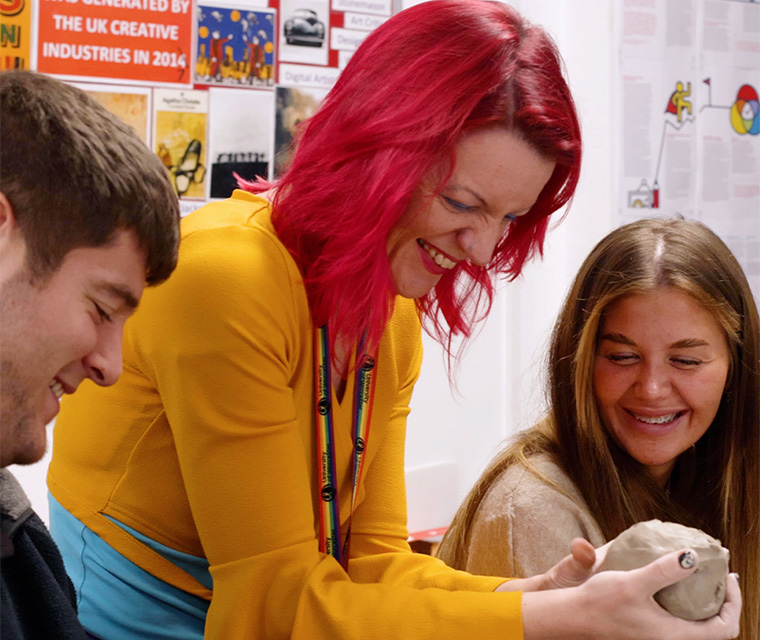We have an excellent reputation with schools in the region and have been training highly skilled, inspirational secondary teachers for over 75 years.
Joint 1st in the UK for Quality Education
We're rated 'Outstanding' for teacher training
University of the Year finalist
Recognised for our graduate success, we’re shortlisted for University of the Year in the Times Higher Education Awards 2025.
Overview
Our postgraduate certificate in education (PGCE) will prepare you to become a successful Psychology teacher with varied school placements, interactive lesson simulations and tailored tutor support.
At Worcester, you’ll gain experience through placement in two different secondary school environments, teaching 14-19-year-olds, whilst receiving support from a subject mentor and University tutors.
When not on placement, you’ll be taught through a mixture of lectures, workshops and interactive subject sessions. In these interactive sessions, our tutors will model effective teaching and classroom management strategies. You’ll also get the opportunity to select one of our enhancement activities, these allow you to pursue a subject that's important to you – from Special Educational Needs and Disabilities (SEND) to teenage mental health.
Beyond the classroom, we’ll enrich your teaching portfolio. You will have the opportunity to teach a second subject to increase your employability and options in secondary education.
When you successfully complete the course, you'll be recommended for Qualified Teacher Status (QTS). QTS is awarded by the Teaching Regulation Agency in England.
Placements
You’ll complete a minimum of 120 days of placement, teaching Psychology in two different schools, so you can experience a wide range of age groups and learning environments. There will also be additional school visit days where you can explore practical strategies for the classroom, with opportunities to practice, rehearse and then implement in school.
We have a strong relationship with over 100 partnership schools, where you will be supported by subject specialist mentors. School mentors are experienced teachers who we work with to make sure you get the highest quality, placement experience.
Regional Training Hubs
You can apply to study a PGCE directly with the University or with one of our partner Regional Training Hubs.
These Regional Training Hubs are networks of schools working together to train teachers. When you apply through a hub you will do a mix of training at their sites and at the University, and the hub will organise your placements within their network of schools.
"Trainees benefit from an exceptional learning experience at the University of Worcester. This experience instils in them a deep-rooted commitment to making a difference to the lives of the children and young adults in the communities they serve."
Upcoming events
Course details
School experience is a substantial and integral part of the course, and you will have visit days and block placements in terms 1, 2 and 3.
The full-time course has 36 contact weeks in total. 24 weeks will be spent in partnership schools. In addition, up to 8 days will be spent in schools focusing on specific teaching skills.
Indicative themes explored through the course content are outlined below.
We regularly review our courses to reflect the latest research and developments in the subject area, as well as feedback from students, employers and the wider sector. As a result, modules may change to ensure the course remains current and relevant.
Careers
This course will qualify you to teach in secondary schools across the UK. Most of our students quickly find jobs after graduation, thanks to the confidence they’ve gained on the course, the connections they make on placement and our excellent reputation with schools in the Midlands region.
Many of our graduates go on to work in schools as an Psychology teacher but our graduates also pursue leadership roles within schools, as curriculum leaders, special educational needs coordinators, key stage leaders, deputies, or head teachers.
The PGCE is an internationally recognised teaching qualification and can widen your opportunities for a career overseas. You’ll be able to seek work in countries such as America, Australia, and Canada.
Student case studies
Some recent graduates reflect on their time on the course.
Course highlights
Teaching and assessment
Teaching is a mix of interactive seminars, classroom simulations, and one-to-one tutorials. Alongside this, you’ll be supported by university staff and school mentors when out on placement. Your assessments will prepare you for a career as a teacher, and include creating a learning resource, delivering a presentation, and writing reflective essays.
Teaching and assessment contents
Teaching
Programme design underpins the Meeting the Teachers’ Standards (2013) and the Initial teacher training (ITT): core content framework (November 2019).
Each programme incorporates a range of teaching, learning and assessment methods including lectures, workshops, peer group activities, seminars, directed reading, independent research, directed study tasks, presentations, e-portfolio, tutorials and school experience. There are also 20 days identified within the provider-based programme for ‘Intensive Training and Practice’ (ITaP), where there is a focus on an area of pivotal practice.
You will experience specialist subject training to develop the necessary knowledge and understanding of their subjects and related pedagogy, which will enable them to teach their subjects across the full age and ability range of training.
Schools and further education settings in the partnership play a crucial role in designing training that provides the range of experiences that students need. ‘The cream of the talent’ from within the partnership, alongside subject specialist tutors, provide taught experiences to give students a breadth of experience and provide them with opportunities to demonstrate all the Teachers’ Standards.
In addition, meetings with Personal Academic Tutors (university lead tutors) are scheduled throughout the course. Tutors and Regional Training Hub Leads also visit students in school to quality assure the process and offer tutorial support.
The majority of teaching sessions will be face to face. There will be elements, especially large cohort sessions, that may be delivered online.
Entry requirements
Honours degree, normally 2:2 or higher from a United Kingdom higher education institution or equivalent qualification, in a relevant subject area. Applicants with a 3rd class degree will be considered on an individual basis.
GCSE grade C/4 in English Language or English Literature and Mathematics, or equivalent qualifications. We do offer an equivalency test if you don’t have the required GCSE grade to apply for our courses.
Trainees who begin courses before providing evidence of the required GCSE standard (or equivalent) will not be eligible for financial incentives, such as bursaries or grants until they achieve the required standard.
Any questions?
If you have any questions about entry requirements, please call our Admissions Office on 01905 855111 or email admissions@worc.ac.uk.
Fees
Fees contents
UK students
The standard tuition fee for full time UK students enrolling on a PGCE in the academic year 2026/27 is £9,790 per year (subject to changes in the government tuition fee cap).
Tuition fees are reviewed annually and may increase each year for both new and continuing students.
For more details on course fees, please visit our course fees page.
International and EU students
The standard tuition fee for full time international and EU students enrolling on a PGCE in the academic year 2026/27 is £18,400 per year.
*Please note that for EU students who are not in receipt of a UK government bursary/scholarship package, the fee is £9,790 per year (subject to changes in the government tuition fee cap).
For more details on course fees, please visit our course fees page.
How to apply
How to apply contents
Applications for PGCE courses, both Primary and Secondary, should be made online through the government's Find Postgraduate Teacher Training website. The course code for English is C8X1.
Start your application
Apply PGCE Secondary PsychologyRegional Training Hubs
You can also apply to study a University of Worcester PGCE with one of our partner Regional Training Hubs.
These hubs are networks of local schools working with us to deliver your PGCE close to where you live and teach, with training and placements organised through the hub alongside support from University of Worcester tutors. You can apply directly via the links below:
- Cleeve Training Hub (C322) - Gloucestershire
- Hereteach Alliance (2XMH) - Herefordshire
- North Worcestershire Teacher Training Hub (A080) - Redditch, Kidderminster, Bromsgrove, Malvern
- Woodrush Training Consortium (35CR) - Birmingham/Bromsgrove
For detailed information on how to apply for a PGCE visit Get Into Teaching.
Contact
If you have any questions, please get in touch. We're here to help you every step of the way.

Secondary PGCE Office
secondary@worc.ac.ukAdmissions Office
admissions@worc.ac.uk01905 855111More to explore
Open Days
Visiting us is the best way to get a feel for student life at the University of Worcester.

The City of Worcester
Worcester is a welcoming university city with great transport links and plenty of student parking.

Accommodation
Benefit from our accommodation guarantee. We have rooms on campus to suit every budget including en-suite options.


